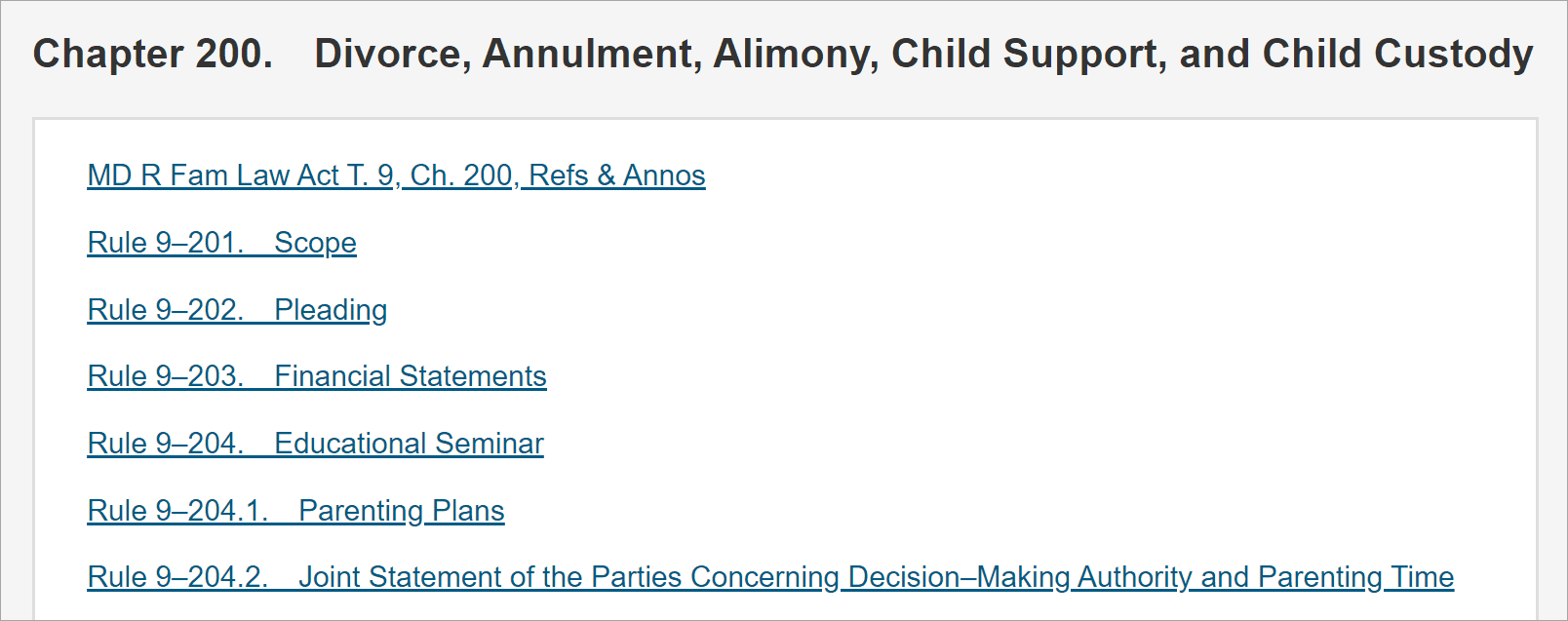Maryland Child Custody Overview
Maryland courts make decisions about custody, visitation and child support based on the best interest of the child. You can file for custody on its own or as part of a divorce or annulment case.
A case can resolve through settlement or litigation. Parents who settle draft a parenting plan together and submit it to the court for review. If approved by a judge, it becomes the final custody order. Parents who don't settle litigate at trial, where a judge or magistrate decides matters.
Types of custody
There are two types of child custody: legal and physical.
Legal custody (also called parental responsibility or decision-making authority) determines who can make decisions for a child about education, health, religion and other important topics. There are two options:
- Joint legal custody: Preferred by the court, this gives both parents a say in the major decisions in the child's life. Parents can make all decisions together (possibly with one parent given a tie-breaking role), or they can assign certain types of decisions to each person.
- Sole legal custody: Only one parent gets to make major decisions for the child. If the other parent spends time with the child, they can still make minor day-to-day decisions.
Physical custody determines where the child lives. It's also called parenting time. The options are:
- Shared physical custody: The child lives with each parent for at least 25 percent of the year. This is the court's preferred option, as long as it fits the needs of the child.
- Primary physical custody: The child lives with just one parent. The other parent almost always still gets time with the child, potentially multi-day visits.
- Split custody: At least one of the parent's children lives with each parent, spending occasional time with the other parent. This is rare.
Opening a case
Legal parents and de facto parents can request custody of a child.
Start by filing a complaint at the circuit court in the county where you or the other parent lives.
E-filing is available everywhere in Maryland. It's optional if you're representing yourself. Even if you open your case on paper, you can switch to e-filing later, but once you file anything electronically, you have to stick to e-filing going forward.
Married parents can file for absolute divorce (a permanent end to marriage), or, in rare cases, they can file for annulment. Parents not married to each other can request custody after the child's parentage is established (more below).
Best interest of the child
The judge focuses on the best interest of the child when making a custody decision. Factors include but are not limited to:
- The child's needs
- Parental fitness
- Domestic or substance abuse issues
- Parent–child relationships
- Parents' work schedules
In some high-conflict cases, a best interest attorney (also called a guardian ad litem) represents the child. The best interest attorney conducts interviews with the family, observes their behavior and advocates for the child in court.
The judge may interview the child in his or her chambers, usually with the parents' lawyers present. If the judge finds the child mature enough, the judge must consider the child's custody preference. (A 2020 Custody X Change study found this is not the case in 25 percent of states.) However, the judge never has to rule in favor of the child's preference.
Length of proceedings and mandatory separation period
The length of the court process depends on your case and county.
The court tries to process cases within one year, but contested ones may go longer. If you settle your case, it can conclude in as little as three months.
Before filing for an absolute divorce, you must live separately or within the same home without intimacy for at least six months — unless you have a settlement ready.
Costs of proceedings
Generally, the longer your case takes, the more it will cost you.
Attorney fees are the most significant costs, with hourly rates between $250 and $350. If you case goes to trial, expect to pay $10,000 to $15,000 total. With exceptional complexity, expect to pay even more. Cases that settle early may cost $200 to $2,000 in attorney fees.
Parents who can't afford an attorney can seek free representation through a legal aid office or the local bar association. Otherwise, parents have the option to represent themselves (details below).
Parents often decide to go to mediation to help them settle their cases. Mediators may charge an hourly rate between $250 and $500.
There is a $165 filing fee to open your case. You might accumulate additional court fees throughout your case.
Representing yourself
The law is complicated, so it's recommended that you hire an attorney to represent you in court. If you plan to settle, experts advise that you have an attorney review your agreement.
If you choose to represent yourself, familiarize yourself with chapter 200 of Maryland's family law code. Keep in mind, the court will hold you to the same standards as an attorney.

Staying organized
The process of deciding custody requires serious organization. You may need to create a parenting plan, draft multiple access or visitation schedules, track your time with your child, calculate expenses and beyond.
The Custody X Change app enables you to do all of that in one place.
With a parenting plan template, custody calendars, an expense tracker and more, Custody X Change makes sure you're prepared for whatever arises in your journey to child custody.
Take advantage of our technology to stay on top of all the moving parts of your case.
